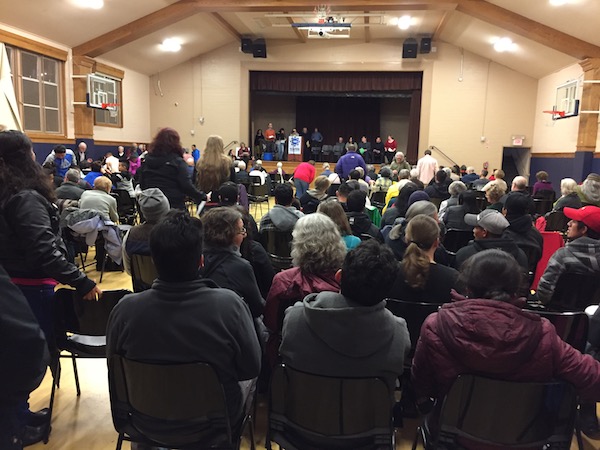The Power of a Story: Organizing Students Attend Marin Action

Less than 48 hours before Donald Trump took the oath of office, CDSP students enrolled in this year’s Organizing for Public Ministry course traveled across the San Francisco Bay to San Rafael to learn about the threats faced by immigrants in the current political climate.
The meeting, which drew more than 300 people, was called by the Marin Organizing Committee, part of the Bay Area Industrial Areas Foundation to which CDSP belongs. Both San Rafael Police Chief Diana Bishop and Dennis Rodoni, a Marin County Supervisor, attended and committed to work on immigrants’ issues.
One woman, reported the Marin Independent Journal, said she was told by a prospective landlord, “We have a new president; you and your people are going to be deported.” Other immigrants reported problems with overcrowding, lack of maintenance, unannounced rent increases, and evictions.
Portia Hopkins, a first-year student in the low-residence MDiv program, said she was moved by the stories of the immigrants at the meeting and impressed at the technique organizers used to share them.
“There was an enormous amount of power in the way they gathered people into circles and encouraged them to share their stories,” she said. Group leaders then gave a summary of each group’s conversation to the entire crowd. The elected leaders who attended were visibly moved by the stories, says Hopkins, as was she.
“There is such power in the voice of the individual,” she says. “These are people who don’t have any power, and don’t feel like people are listening to them. But they have stories.”
For Kathleen Moore ’19, hearing from immigrants about the discrimination they face lent urgency to the community organizing class, required for all MDiv students.
“In the current political climate, it’s so easy to feel overwhelmed and defeated,” Moore says. “I was inspired by the way broad-based community organizing breaks up the hard work, and encourages us to focus on local, ‘winnable’ fights. It starts with real conversations and it’s all about building relationships. It was inspiring to see families in San Rafael tell their stories and have their concerns acknowledged by the police chief and county supervisor.
“Right now, using the IAF approach of simply getting to know our neighbors in our communities seems like a particularly effective and appropriate way for churches to make a difference and to combat that feeling of helplessness,” she says.
Academic Dean Ruth Meyers, who taught the course in tandem with IAF organizers, says the week-long intensive training develops skills, tools and theoretical capacity for community organizing, and helps students connect community organizing to Christian faith and practice. “What many students come to understand is that organizing is not just for work that happens in the wider community,” she says. “Congregational development is also a kind of community organizing, and through this course, CDSP students are building their ability to make the boundaries between the church and the world more porous.”
For the Rev. Rafael Pereira of the Diocese of Nevada, a student in that diocese’s local formation program, the event had biblical meaning. “The action at San Rafael was exactly living out the Gospel when Jesus fed the 5,000,” he says. “It was a rainy day, especially at the time we traveled to San Rafael, and I could compare my feelings with the disciples, when they questioned Jesus. I thought that just a few people were going to show up due to the weather. When we got there and saw the large crowd, we became one community working together for justice and the needs of our brothers and sisters, for the common good.
“Organizing people and organizing money will lead you to change the world.”

